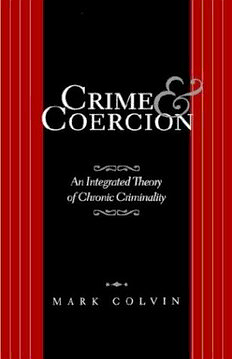
Crime and Coercion: An Integrated Theory of Chronic Criminality PDF
225 Pages·2000·0.708 MB·English
Most books are stored in the elastic cloud where traffic is expensive. For this reason, we have a limit on daily download.
Preview Crime and Coercion: An Integrated Theory of Chronic Criminality
Description:
In a major new theory of criminal behavior, Mark Colvin argues that chronic criminals emerge from a developmental process characterized by recurring, erratic episodes of coercion. Colvin’s differential coercion theory , which integrates several existing criminological perspectives, lays out a compelling argument that coercive forces create social and psychological dynamics that lead to chronic criminal behavior. While Colvin’s presentation focuses primarily on chronic street criminals, the theory is also applied to exploratory offenders and white-collar criminals. In addition, Colvin presents a critique of current crime control measures, which rely heavily on coercion, and offers in their place a comprehensive crime reduction program based on consistent, non-coercive practices.
See more
The list of books you might like
Most books are stored in the elastic cloud where traffic is expensive. For this reason, we have a limit on daily download.
